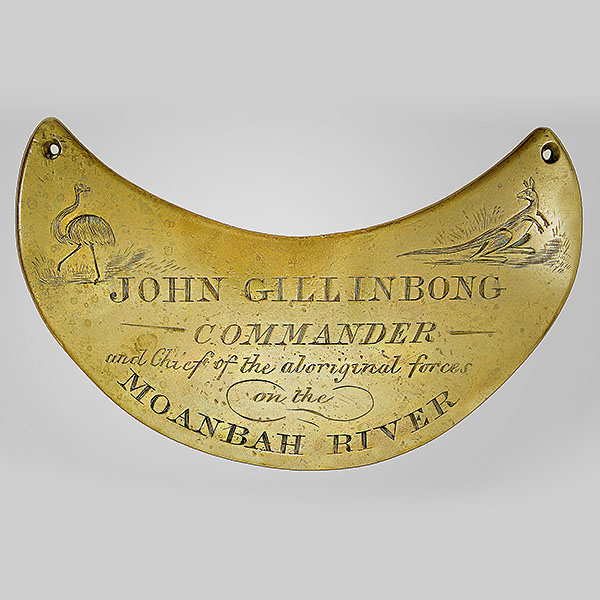Inscribed: JOHN GILLINBONG/COMMANDER and chief of the aboriginal forces/on the/ MOANBAH RIVER
Captain John Maunder Gill of the 46th Regiment arrived with his Regiment in 1813. After a short stint as ADC to Macquarie he was appointed Acting Engineer in charge of the Sydney Lumber Yard (1814 to late 1817). Soon after his arrival he adopted an aboriginal boy who took his name John M. Gill.
Biriban or Johnny McGill or I suggest John Gillinbong was born at Bahtahbah, now Belmont in NSW, into the Awabagal language group centred on Newcastle and Lake Macquarie. He acquired his European name from Gill who brought him up at the Military Barracks in Sydney where he learnt to speak and possibly write English, hence the lengthy inscription.
On Gill’s departure Biriban presumably moved to Newcastle under the care of Capt James Wallis for he was painted there for “ceremony” by the convict artist Richard Browne (1776-1824) this image now in the National Library of Australia titled “Magill”. Wallis was appointed Commandant of Macquarie’s new settlement in 1816 and he gifted an Old Sheffield waiter, sold by me to the Mitchell Library, to “Capt Gill” on Gill’s departure to England to get married in 1817.
This Gorget is a very early sand cast example probably cast in the Lumber Yard Sydney before 1821 and therefore presented by Macquarie before he left the Colony. The Moanbah River may relate to the Moonbah River a tributary of the Snowy River in Southern New South Wales. The New South Wales aborigines from time immemorial had made special visits to this area to collect and eat the Bogan moths when in season. I suggest Commander relates to Biriban’s military background.
Biriban or McGill was to receive another gorget in 1830 from Governor Darling inscribed “Barabahn or MacGill, Chief of the Tribe of Bartabah on Lake Macquarie a Reward for his assistance in reducing his Native Tongue to a written Language”.
The Reverend Lancelot Threlkeld for whom McGill acted as interpreter from 1824 and an informant over language stated “McGill spoke the English language fluently…. a noble specimen of his race my companion and teacher in the language for many years”.
McGill died in Newcastle on 14th April 1846.

